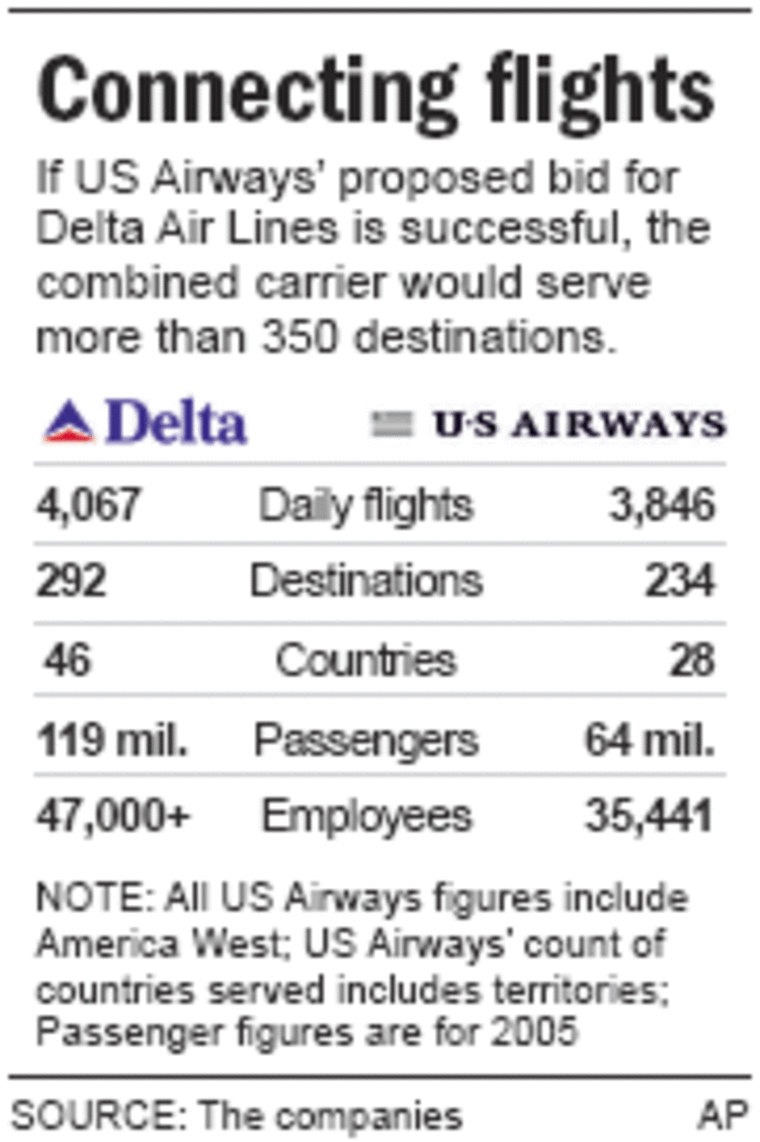If US Airways Group is successful in its $8 billion bid for Delta Air Lines, it would not only create one of the world’s largest airlines but also could lead to a new round of consolidation in the U.S. airline industry, analysts said Wednesday.
The deal would create the nation’s largest airline, larger even than American Airlines — a startling outcome for a carrier that has gone through bankruptcy twice, emerging most recently in 2005.
US Airways’ Chief Executive Doug Parker has long pushed for consolidation in the industry and first approached Delta — which is currently operating under bankruptcy protection — last spring.
Last year, as chief executive of America West, Parker pulled off a similar deal, proposing a merger with US Airways while that airline was still in bankruptcy. After US Airways emerged from bankruptcy the merger was completed and the airline retained the name of the better-known carrier.
“The success of consolidation is quite clear,” Parker told CNBC Wednesday. “[We have] already proved it with America West and US Airways, and our investors are quite happy,” he added.
In a letter outlining the proposal, Parker said the deal with Delta could create $1.65 billion in “annual network and cost synergies” including $710 million in reduced expenses.

So far, Delta has sounded antagonistic to Parker’s advance, but if he ultimately pulls it off and regulators approve it, the deal “will probably set off a series of potential [merger] activity in the industry,” said airline analyst Ray Neidl at Calyon Securities.
Industry observers like Neidl have long said that a new round of mergers is a logical next step for the airline industry, now that it is just beginning to get its legs back under it after billions of dollars in losses, cost-cutting and capacity reductions that followed an industry downturn brought on by a slump in the U.S. economy, a surge in fuel prices and the Sept. 11, 2001, hijackings.
The likely targets have been identified as bankrupt airlines including Delta Air Lines and Northwest Airlines, which are now approaching their exits from Chapter 11 protection.
Under bankruptcy, these airlines have been able to streamline their businesses, restructure fleets and renegotiate labor and vendor contracts and are expected to resurface leaner and meaner — ultimately, more attractive merger partners.
U.S. Airways itself is a good example. Since emerging from bankruptcy and merging with America West, the combined carrier has seen its business rebound and its stock price more than double.
Still, challenges remain for a deal between US Airways and Delta. It’s unclear whether it will pass regulatory muster, and integrating airlines is difficult, as it involves combining unionized labor with different rules and wage scales. Another challenge is integrating flight routes and aircraft fleets.
And at present Delta looks like it is not interested in deal. CEO Gerald Grinstein said in a statement Wednesday that the airline’s plan “has always been to emerge from bankruptcy in the first half of 2007 as a strong, stand-alone carrier,” adding that Delta has until Feb. 15, 2007, to structure its bankruptcy reorganization plan.
Delta may have cold feet, but Wall Street certainly thinks the deal has merit. Investors sent US Airways’ stock price up sharply Wednesday. Airline analyst David Strine at Bear Stearns said a combination of U.S. Airways and Delta would bring clear synergies. “Why Delta is not seeing the same value as US Airways is not clear,” he told CNBC Wednesday.
More broadly, if the deal is actually consummated it will be a great incentive for other airlines to “play ball,” Strine added. Other major legacy carriers, including Continental and American Airlines, “will be forced to think about what they need to do with routes and balance sheets to compete with” the new combined carrier, he said.
Analysts have long said that the big airlines have too much capacity, which is seen as a barrier to long-term profitability, and mergers give airlines more control over capacity.
Jeffrey Miller, a Maryland travel industry lawyer, is less sanguine about the impact of the proposed deal. There may be other bidders for Delta, or for parts of its business, and US Airways has not yet completed the difficult task of integrating the two companies from its America West merger.
“Let’s wait a few more years to see if the America West deal is really successful,” he said.
A deal with Delta, if it goes through, also could be a disaster because of a clash of very different corporate cultures.
“Add all those things together in one unit and it will be a disaster,” he said, adding that while the two airlines may find business synergies, the traveling public is unlikely to see much of a benefit.
“The industry is cutting salaries and pensions, so workers are likely to give worse service,” Miller said.
Passengers are also likely to see fewer flights. US Airways’ Parker said that if a deal is approved between the two carriers they would need to divest overlapping assets. Analysts have focused on the fact that both companies operating “shuttle” operations in the Northeast corridor and have speculated that one might have to be spun off into a separate company.
Analysts also said that to address regulators’ antitrust concerns and meet a strategic goal of trimming capacity by 10 percent, the combined company would probably forfeit airport gate slots in places including like Charlotte, N.C., Atlanta and across Florida. Those gates would likely be picked up by other airlines, including American, Northwest and United.